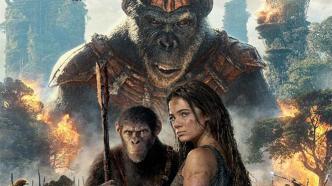
Note: This article contains serious spoilers
Before watching "Rise of the Planet of the Apes: New World", my biggest curiosity was: what new elements will it bring based on the 2011 trilogy? As one of the oldest IPs in Hollywood, the "Planet of the Apes" series has been able to come all the way to today by constantly keeping up with the times and injecting fresh blood into the film.
Here is a review of the history of the "Planet of the Apes" series: The first film in the series was released in 1968. It tells the story of a human astronaut who traveled to the year 3955 in a spaceship. The spaceship crashed on a strange planet ruled by apes, and the astronauts were imprisoned by the apes. At the end of the film, after the astronauts escaped from prison, they found the collapsed Statue of Liberty on the beach and realized that this was the Earth. The impactful ending made this film a classic in the history of science fiction movies.
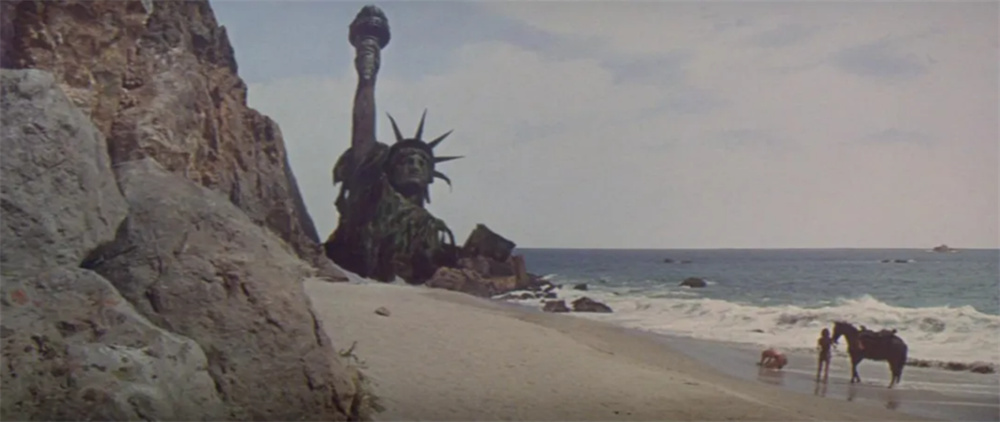
The collapsed Statue of Liberty
After that, the series was filmed for four more films. In the subsequent films, humans and apes were destroyed by nuclear bombs in the final battle. Only a pair of ape scientists escaped on a human spaceship and returned to Earth in 1972. The ape scientists were persecuted to death by humans, but their newborn child Caesar escaped with the help of humans. When Caesar grew up, he witnessed all kinds of discrimination and enslavement of apes by humans. In the end, he decided to lead the apes to overthrow human rule and establish the Planet of the Apes.
From the extinction of mankind and the rule of the Earth by other species to the story structure that forms a closed loop of the ending and the beginning, the "Planet of the Apes" series has contributed a series of extremely wonderful science fiction ideas and influenced countless subsequent science fiction works.
At the same time, "Planet of the Apes" also had a distinct social significance at the time. The relationship between apes and humans was an allusion to the racial system in the United States at the time. The film's satire on anthropocentrism and hierarchy is still relevant today, and the ending in which apes and humans perished together in a nuclear bomb also reflected the Cold War panic of society at the time.
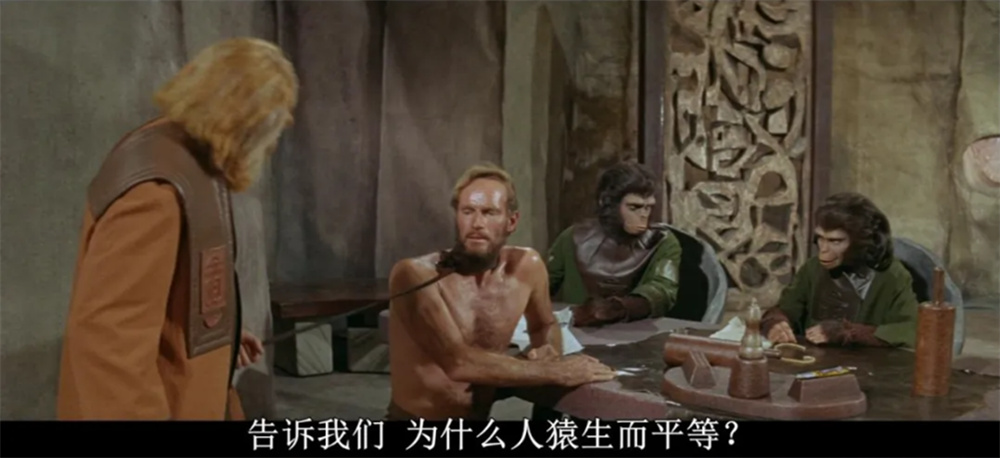
“Why are humans and apes created equal?”
In 2011, the rebooted "Rise of the Planet of the Apes" trilogy revitalized the IP. If the old version was about sci-fi creativity and political allegory, the new trilogy is about stunning CG effects and a story full of dramatic tension.
The lifelike hair and skin texture, coupled with Andy Serkis's superb facial expressions, made Caesar the gorilla a milestone in the history of movie special effects, shocking audiences around the world. Some viewers even suspected that Caesar was not CG at all, but a real trained gorilla.
In terms of plot, the new trilogy is basically a remake of the last three parts of "Planet of the Apes", but a lot of adjustments have been made to fill in more details to make the whole story more reasonable. For example, in "Planet of the Apes", Caesar's intelligence was inherited from his scientist parents, while in the new trilogy, Caesar was originally an ordinary ape, and gained intelligence because of the ape flu virus. The ape flu can also cause human degeneration, which also explains why the apes can defeat humans.
The new trilogy also greatly strengthens Caesar's emotional description. As the leader of the apes, Caesar must resist human slavery and fight for freedom for the apes. His deep feelings for humans make him hope that the apes and humans can coexist peacefully. But the earth cannot accommodate two intelligent species after all. Faced with the fundamental opposition between the apes and humans, all Caesar's efforts are in vain. At the end of the third part, the apes won the final victory, and Caesar also ushered in his death, drawing a period for his legendary life.
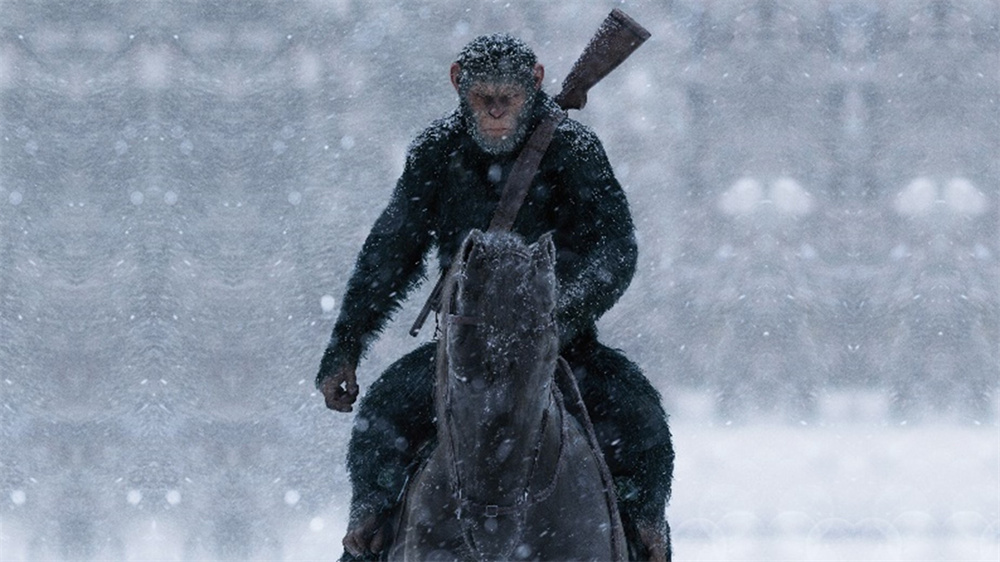
In general, the new trilogy is a perfect inheritance and development of the old version. After breaking away from the rut of political allegory, the new trilogy inherits the old version's criticism of anthropocentrism, uses cutting-edge CG to create a very charming tragic hero, and deeply explores the theme of "whether two intelligent species can coexist".
Seven years later, the latest film in the series, "Rise of the Planet of the Apes: New World", was released worldwide. Did it bring any new elements to this IP that keep up with the times? Unfortunately, no.
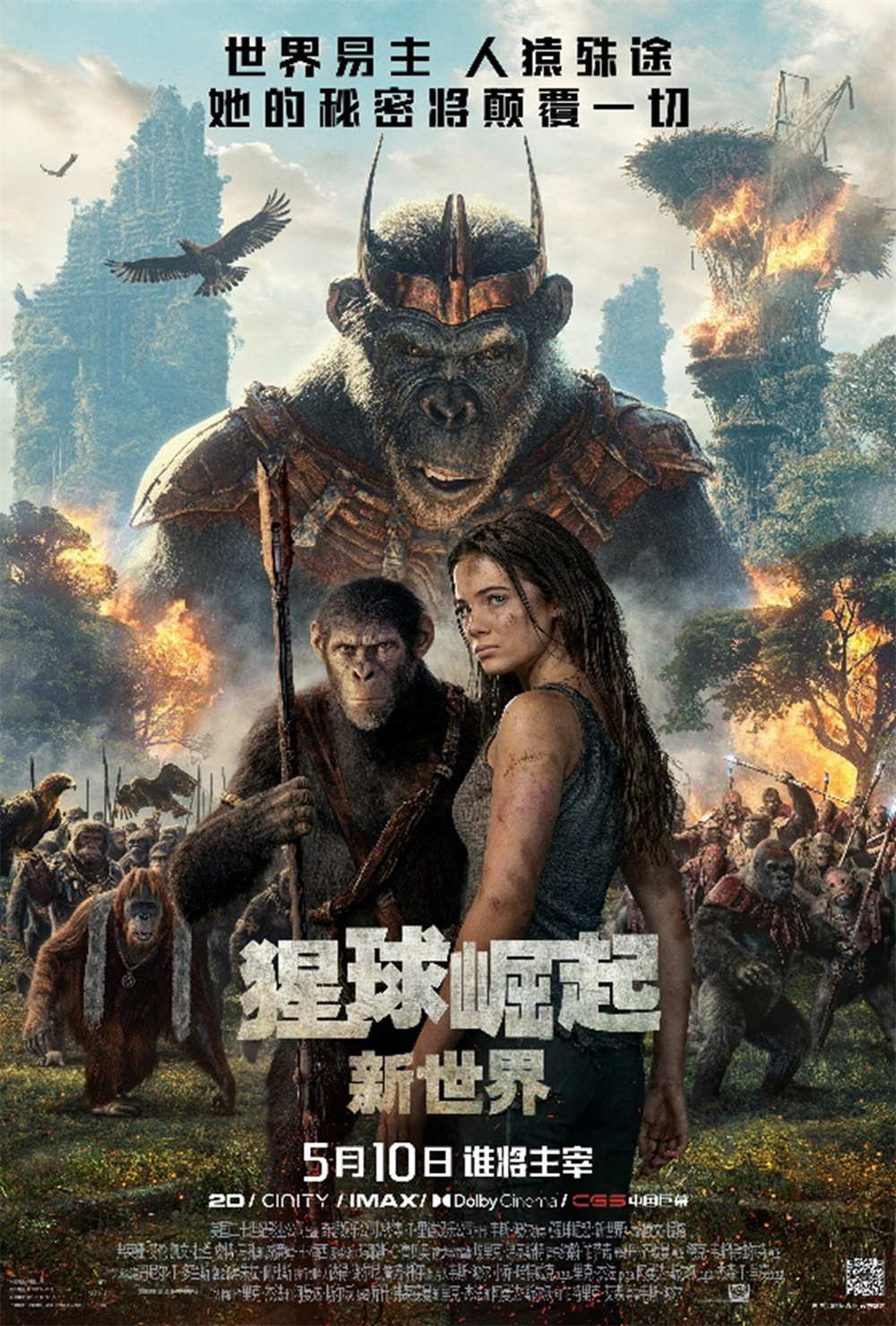
"Rise of the Planet of the Apes: New World" poster
This film is basically one big trailer, and its main content is to introduce new characters and set the stage for the subsequent war between humans and apes.
The story takes place more than 300 years after Caesar's death. The protagonist is Noah, a young ape whose tribe is captured by the ape leader named Caesar. In the process of tracking Caesar, Noah meets Mei, a human girl with normal intelligence, who is also Caesar's target.
After the two were captured by Caesar, Noah finally knew Caesar's purpose: Caesar wanted to open the human fortress, obtain the high-tech equipment and weapons in the fortress, and achieve the evolutionary leap of the apes. And Mei carried the map of the fortress, and Caesar hoped to use her to enter the fortress.
At the end of the film, Noah and Mei blew up the dam outside the fortress, causing seawater to flow back into the fortress and destroying all the equipment inside. Noah also defeated Caesar and became the new leader of the tribe. Mei got the satellite communication key from the fortress and used it to establish contact with the surviving humans in the fortresses scattered around. A new round of war between humans and apes was about to begin.
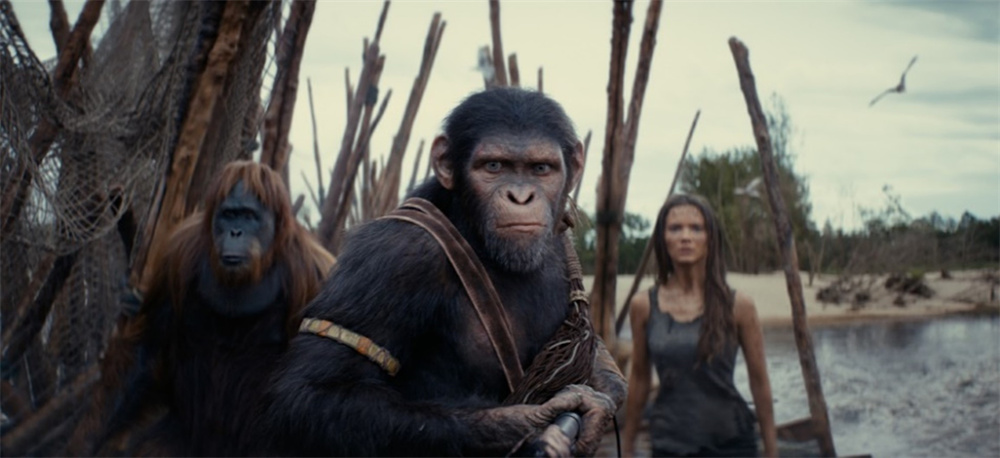
Stills from "Rise of the Planet of the Apes"
Director Wes Ball said in an interview that he wanted to explore "whether two different species can coexist." But is this really necessary? The new trilogy has already explored this theme very thoroughly, and the answer is clear: there can only be one ruler of the earth, and humans and apes have formed a deep hatred, and can only fight to the death.
What will the next movie be about? Will it be about the battle between apes and humans? The new trilogy has proven that the battle between humans and apes is not very entertaining. It is nothing more than the apes using their body flexibility to fight guerrilla warfare with humans or setting various traps.
The biggest highlight of the new trilogy is still Caesar himself. Caesar's unfortunate experiences, advocacy of peace and personal charm will make the audience empathize with him. They want to know how he deals with humans and apes and what challenges he will encounter. The resulting dramatic tension will attract the audience to watch all the way.
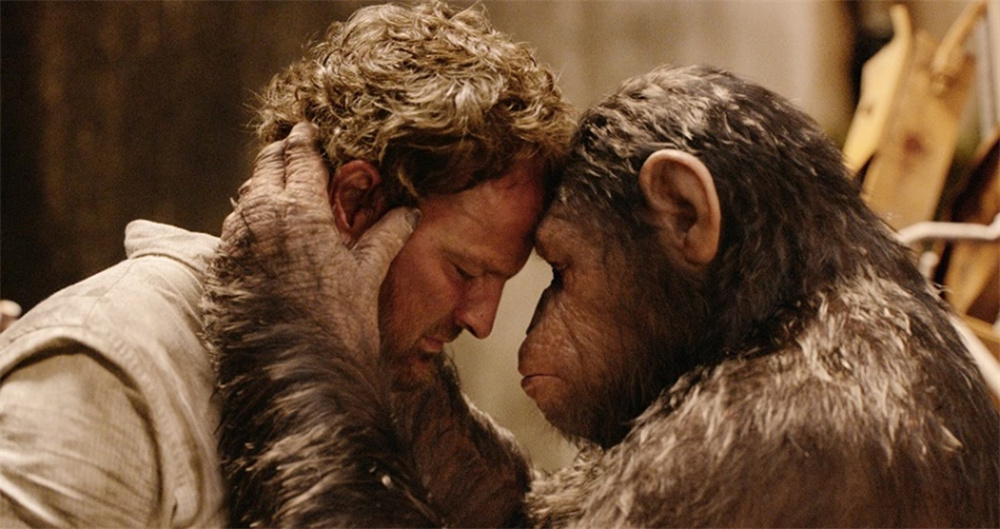
Stills from "Rise of the Planet of the Apes"
However, in this film, the thin character creation makes it difficult for the audience to empathize with either side, and the characters' clear camp affiliation makes the subsequent plot lack of appeal.
Although the film wants to portray Noah as the successor of Caesar's philosophy, the philosophy Noah inherited is mainly "Apes are stronger when united" rather than "Humans and apes should coexist peacefully". After this adventure, he knows that humans have intelligence and also sees the selfish side of humans. If humans start a war, Noah will definitely do his best to deal with it. At the end of the film, he gave the Caesar symbol to May, which is certainly his expectation for peace, but also implies that whether they can coexist depends on humans, not the apes.
As for the human characters, they are even thinner. Mei is full of anthropocentrism, believing that humans are the real masters of the earth and that apes are born to be ruled by humans. Although she was saved by the apes twice, she still chose to sacrifice the apes for the benefit of humans without hesitation. Such a character is really hard to like.
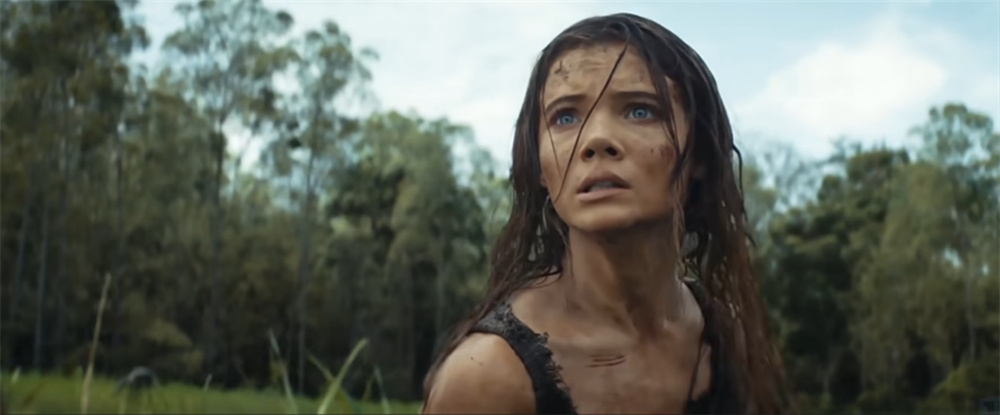
Stills from "Rise of the Planet of the Apes"
Compared with the two thin protagonists, the villain Caesar is more vivid and three-dimensional: he likes to read ancient Roman history books, and hopes to emulate humans to establish a unified ape empire and lead the apes out of primitive society and into slave society. He also wants the apes to learn advanced human knowledge and use various high-tech equipment to accelerate the evolution of ape society.
In order to achieve his goal, Caesar respected talents very much, regardless of race and tribe: he treated literate old human men as teachers and taught history lessons every day; after knowing that Noah could repair electric batons, he thought Noah was very smart, so he treated Noah with good food and drink, hoping to recruit Noah under his command.
Although Caesar was a dictator and distorted Caesar's ideas to endorse his own rule, it must be admitted that his ideas were very advanced and he was a leader with a big picture view. If he really succeeded, his historical status in the ape tribe would be second only to Caesar. No wonder some people on the Internet jokingly called Caesar the "First Emperor of the Apes."
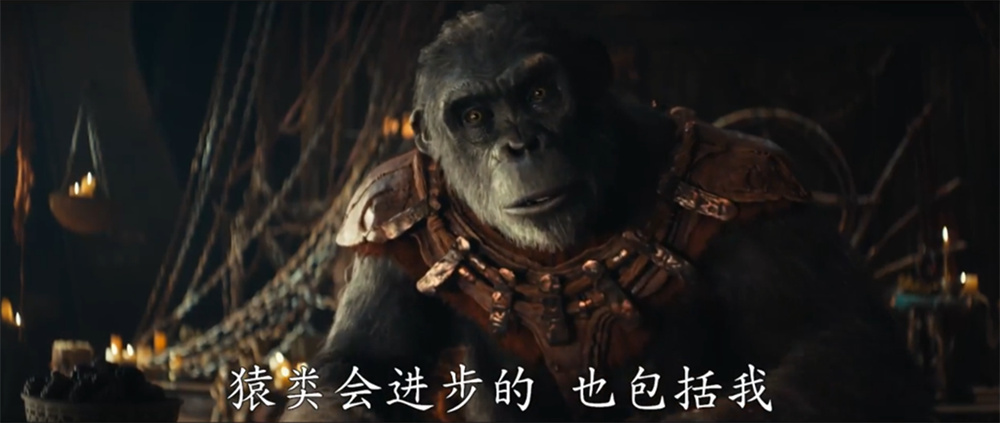
Screenshot of "Rise of the Planet of the Apes: New World"
When I watched the movie, I thought: if the film was based on the evolution of ape society with Caesar as the protagonist, telling how apes used human knowledge to develop civilization, and adding some factional disputes with different ideologies in the middle, and finally connecting with the beginning of the first part of the old version, it would be quite innovative. Unfortunately, the director obviously didn't think so much, and let Caesar fall into the sea and die at the end of the film.
Apart from the villain Caesar, the film has no new elements that catch people's eyes until the end. It only leaves two thin new characters and the subsequent unattractive war between man and ape. As a work that connects the previous and the next, it can't be called excellent.
In order to allow humans and apes to fight back and forth, the film has obvious problems with its setting. The apes in the new trilogy can read and write, can use modern weapons skillfully, and have established a strict organization. However, the apes in this film have regressed to primitive society, can neither read nor see a gun, and have split into independent tribes. The only progress is that the language has become more fluent. It makes people confused: What have the apes been doing for the past 300 years? Why are they going backwards?
Since the apes were forced back to primitive society, the plot also had a logical problem. According to the plot of this film, Mei and her people were not affected by the ape flu and had normal human intelligence. They knew the true history of the past and the location of the vents to enter the fortress. So the same question arises: What have humans been doing for the past 300 years? If they could enter the fortress earlier, wouldn't it be easy to use the weapons inside to eliminate the primitive apes?
Moreover, there are fortresses of surviving humans everywhere, and humans also have protective clothing to prevent virus infection, so why don't humans take the initiative to attack? It's impossible that there are no weapons in the fortresses? Maybe the sequel will explain these problems, but they do affect the perception of this film. When the world view cannot be self-consistent, the story loses its immersion and sense of substitution.
The film's Douban score is 6.7, the lowest in the series. Can the sequel restore its reputation? I have my doubts.


